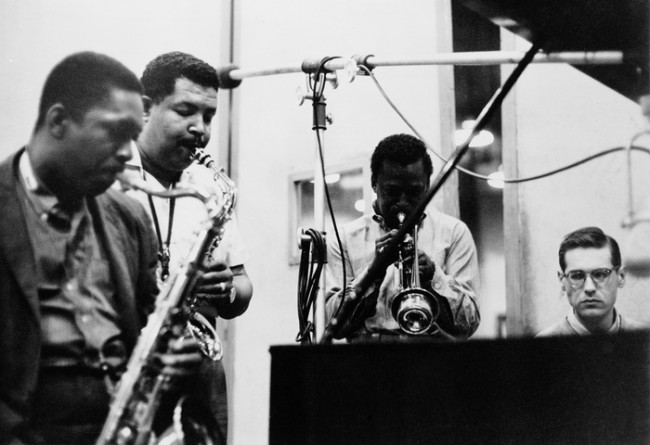Dedication: Kassow Hillel Kosher Eatery
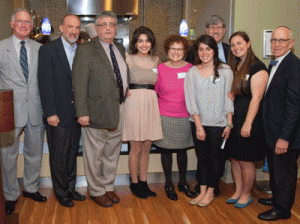
“HARTFORD, CT, May 7, 2012 – With a grand flourish and a pair of oversized scissors, a group of administrators, faculty, students and alumni leaders cut a large ribbon in the Mather Dining Hall on May 3, marking the formal dedication of the Kassow Hillel Kosher Eatery at Trinity, a place where Jewish students as well as students of all faiths can dine on kosher food for the first time in the 189-year history of the College. The culinary addition to the Dining Hall was made possible by gifts totaling $125,000 from individuals and organizations, including the Zachs family, the Samuel Roskin Trust at the Hartford Foundation for Public Giving, and the law firm of Rogan Nassau LLC in Hartford. The eatery is named in honor of two distinguished members of the Trinity community: Lisa Pleskow Kassow, director of Trinity College Hillel, and Samuel D. Kassow ’66, Charles H. Northam Professor of History. Read the rest of article HERE.”
In Defense of Liberal Arts Education by Prof. Greenberg
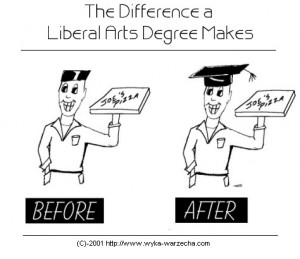 On May 1st, Prof. Greenberg engaged in a dialogue about the the merits of liberal arts education, which was published in the New York Times. Specifially it was a response to “The Imperiled Promise of College (April 29th, by Frank Bruni).
On May 1st, Prof. Greenberg engaged in a dialogue about the the merits of liberal arts education, which was published in the New York Times. Specifially it was a response to “The Imperiled Promise of College (April 29th, by Frank Bruni).
“While Frank Bruni is certainly right that college is too expensive and that we need more people to study science, math and engineering, I disagree with him about the lack of value of a humanities degree. Perhaps as a history professor at a liberal arts college, I am being defensive. But while a specific degree in communications or accounting may land you a well-paying job sooner, a liberal arts degree better equips students for the ever-changing job market they face. Many of the jobs today are in fields that hadn’t been invented 10 years ago. Most workers today will change not just jobs but careers several times in their lives. What does one need to succeed, even flourish, in such a market? The ability to think creatively, read critically, construct effective arguments using persuasive evidence, write clearly, remain flexible and look at issues with an open mind. These are skills taught best in broad liberal arts settings — even in majors like philosophy or zoology.”
(more…)
Juan Hernandez Elected to SGA

Congratulations to Juan Hernandez ’13 who was recently elected Vice President of Multicultural Affairs. “The Student Government Association (SGA) was forced to call an emergency meeting on Wednesday, April 18 after the results of the elections for the SGA Executive Board were called into question. Dobromir Trifonov ’13’s election as next year’s SGA President was contested after he was accused of allegedly violating the SGA’s Constitution by tabling for votes in the library and sending a mass email to a portion of the student body. At the meeting on Wednesday, charges were brought against Trifonov for these violations, and also against runner-up Alexa Mehraban ’13 for allegedly covering opponents’ posters and also sending a mass email. After a heated discussion, it was decided that the results would remain unchanged, and Trifonov would retain his victory.” For more information on the SGA elections go HERE.
Writing to Music, Vol. 1
Do you prefer to write to music? What music do you like to listen to when you write? Does playing music depend on where you are at in the writing process? Can you only listen to music without lyrics? These were the kinds of questions posed to both students and faculty in the History Department. The answers may very well surprise you, but you’ll have to listen to find out. Here is volume one (with more to come) and an insightful reflection provided by Prof. Bayliss on one of his favorite songs to write to: Miles Davis’ “All Blues” from the classic album Kind of Blue. Enjoy.
Honors Day – History Students Recognized
 “Following World War II, President Funston encouraged reestablishment of the College’s academic pageantry, which had been curtailed during the war. Matriculation and the Book Ceremony for first-year students were both brought back, and, in the spring of 1950, Honors Day was added as a new ceremony. Honors Day was intended to be an occasion when all Trinity prizes and awards—with the exception of those given out at Commencement—could be celebrated in the presence of the entire College community.” Ten history student majors were awarded prizes for community service and academic scholarship. Congratulations to Virgilio Bissio, Erin Dorsey, Paige Durgin, Brooke Grasberger, Joseph Laws,, Michael McLean, Mixashawn Rozie, Francis Russo, Carolyn Taratko, and Adam Whitehurst.
“Following World War II, President Funston encouraged reestablishment of the College’s academic pageantry, which had been curtailed during the war. Matriculation and the Book Ceremony for first-year students were both brought back, and, in the spring of 1950, Honors Day was added as a new ceremony. Honors Day was intended to be an occasion when all Trinity prizes and awards—with the exception of those given out at Commencement—could be celebrated in the presence of the entire College community.” Ten history student majors were awarded prizes for community service and academic scholarship. Congratulations to Virgilio Bissio, Erin Dorsey, Paige Durgin, Brooke Grasberger, Joseph Laws,, Michael McLean, Mixashawn Rozie, Francis Russo, Carolyn Taratko, and Adam Whitehurst.
List of Award Winners & Awards:
(more…)
Mixashawn Rozie ’12 Performs at the Samba Fest
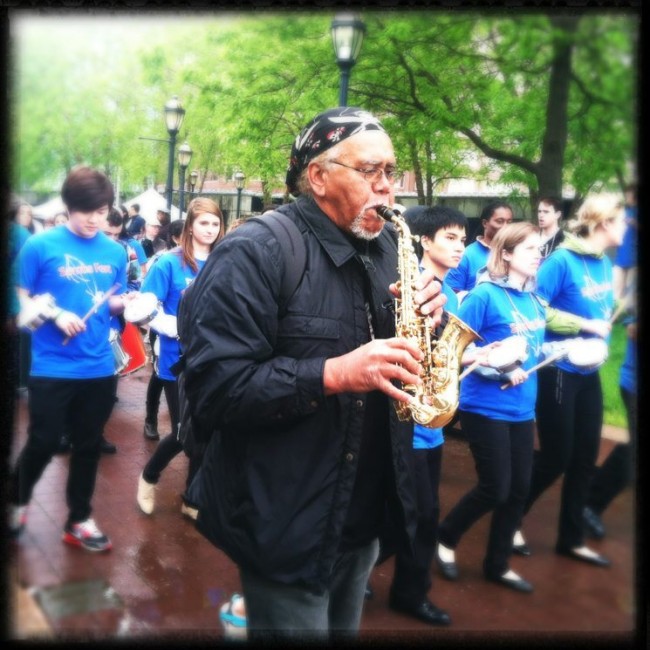
Mixashawn Rozie is not only an IDP adult student, who will be graduating from Trinity with a B.A. in History in a few weeks, he is also a well respected artist and musician As stated on his website, Mixashawn has “captured and enlightened audiences in the United States and Europe for more than three decades. His incarnation as The Wave Artist draws upon a heritage of multicultural innovation that spans four centuries and both sides of the Atlantic Ocean. In applying to his arts an ancient understanding of waves in their multiple manifestations — sonic, aquatic, percussive, harmony — Mixashawn expresses a reverence for the unity and universal qualities that all waves possess and celebrates the unity of existence.” This past Saturday he performed Trinity College’s 6th Annual Samba Fest at the Mortensen Riverfront Plaza in downtown Hartford.
(more…)
Photographs from Convois & Trinity-in-Trinidad Site Visit
“I returned to Trinidad 10 years or so after my first visit, now with a renewed commitment to engaging the country’s rich history in the context of my research on race and ethnicity in the Caribbean and Central America, and also in the context of deepening ties to the History Department at the University of the West Indies. The latter is important, not only for my research, mostly in Spanish, but because that academic venue, in English, can provide future research opportunities for our students in the English-speaking Caribbean. Few countries in the Caribbean are as apt for studying the African Diaspora in the Americas, for example, than Trinidad & Tobago.” — Prof. Euraque
(more…)
Professor Joan Hedrick Delivers Annual Wassong Lecture
 |
|---|
| From left to right: Vijay Prashad, George and Martha Kellner Chair in South Asian History and Professor of International Studies; Lida Maxwell, assistant professor of political science; Joseph Wassong IV; Rebecca Skinner; Joan Hedrick, Charles A. Dana Professor of History; Joseph Wassong ’59; Trinity President James F. Jones, Jr.; John Wassong; and Tina Wassong. Photo by Nick Lacy. |
“HARTFORD, CT, April 26, 2012 – Author Harriet Beecher Stowe and Ellen White, prophet and co-founder of Adventism, played instrumental roles in the context of 19th century American Christianity, particularly during the volatile decade of the 1840s, when institutional churches were divided over the issue of slavery. That was one of the major themes of the annual Shirley G. Wassong Memorial Lecture in European and American Art, Culture and History, delivered April 23 by Joan D. Hedrick, Charles A. Dana professor of History and winner of the 1995 Pulitzer Prize for Biography for her book, Harriet Beecher Stowe: A Life. “The most important parallel between Ellen White and Harriet Beecher Stowe is that for both, visions provided both an oppositional plan and a way forward at a time of group and national confusion, respectively,” said Hedrick. “Both Stowe and White excoriated the complicity of organized religion in perpetuating slavery. Hedrick described that period in U.S. history as a time of great flux, when a number of women became outspoken seers, speakers and writers. Hedrick’s talk largely focused on the role of White, who is not as well known as Stowe, “in the early, radical period of Adventism” and on Stowe’s “religious experiences in decades leading up to the Civil War.” Stowe is best known for her book, Uncle Tom’s Cabin, an anti-slave novel published in 1852 and which some believed helped lay the groundwork for the Civil War. Uncle Tom’s Cabin was the best-selling novel of the 19th century.”
Read entire article HERE.
Lecture: “The Tragedy of Leon Trotsky”
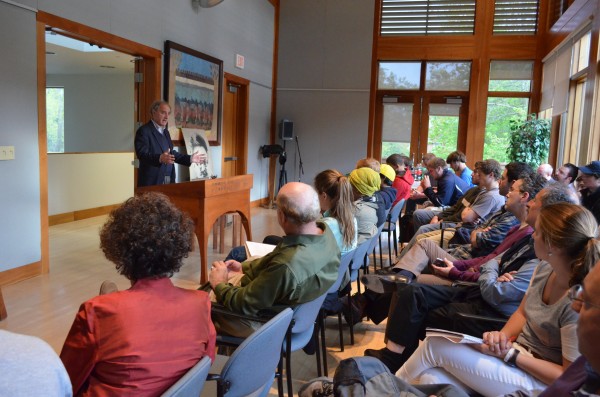 By Jacob Prosnit (Class of 2012)
By Jacob Prosnit (Class of 2012)
On Wednesday, April 25th, the Jewish Studies Department and the History Department sponsored a lecture by Joshua Rubenstein entitled, “The Tragedy of Leon Trotsky{. Rubenstein works for Amnesty International and is a long-time associate of the Davis Center for Russian and Eurasian Studies at Harvard University. His latest book, Leon Trotsky: A Revolutionary’s Life was published at Yale University Press in October 2011 and was the basis for the talk. Among many things, Rubenstein discussed Trotsky’s personal life, his rise to power with Lenin, his momentous struggle for power against Stalin and his famous death in Mexico. The afternoon lecture took place at the Hillel House on Vernon Street and was well attended by students and faculty alike.
(more…)
Internship Spotlight.2: News as an Archive
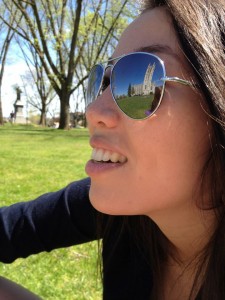 By: Jessica Wachtel (History, Class of 2012). Last week I was asked by my faculty internship sponsor: In what ways has majoring in history informed my thinking and/or prepared me for work in the media field? Majoring in History has assisted me for my career in the media field by giving me a general background of international historical events and the way in which humans have recorded and preserved their own history. Through the medium of television broadcasting, news has been documented to give to historical events that have been framed through an eyewitness account or experience. News can be used as an archive to relate to in the future as a record of the progression of mankind and it is the journalist’s responsibility to inform the public of these events so they develop a social consciousness and awareness of what is going on around them and how these events can impact their daily lives. It is a civic duty to be in media communications as a means of passing on information to the public and leaving a legacy for the future human race.
By: Jessica Wachtel (History, Class of 2012). Last week I was asked by my faculty internship sponsor: In what ways has majoring in history informed my thinking and/or prepared me for work in the media field? Majoring in History has assisted me for my career in the media field by giving me a general background of international historical events and the way in which humans have recorded and preserved their own history. Through the medium of television broadcasting, news has been documented to give to historical events that have been framed through an eyewitness account or experience. News can be used as an archive to relate to in the future as a record of the progression of mankind and it is the journalist’s responsibility to inform the public of these events so they develop a social consciousness and awareness of what is going on around them and how these events can impact their daily lives. It is a civic duty to be in media communications as a means of passing on information to the public and leaving a legacy for the future human race.
(more…)
